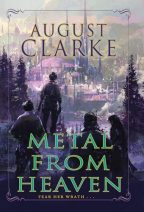 Booklist: Ten years ago, Galwell, his younger sister Elowen, Beatrice, and Clare saved the realm of Mythria from dark magic. But after Galwell sacrificed himself to ensure the success of their mission, the three friends went their separate ways. However, Beatrice, Clare, and Elowen now face a reunion when Queen Thessia, who was once engaged to Galwell, invites them to her upcoming wedding. Given their still unresolved romantic feelings for each other, the last thing Beatrice and Clare want to do is spend time together. Elowen is equally determined to keep her distance from professional assassin Vandra, who not only helped the trio on their last mission but also helped herself to Elowen’s heart. Then again, it is just an invitation to attend a wedding. What could possibly go wrong? With an abundance of winsome charm and wry wit, Asher—a pseudonym for the collaborating romance authors Bridget Morrissey, Emily Wibberley, and Austin Siegmund-Broka—fashion an enchanting tale of self-discovery and second chances that is a rare treat for both romance readers and fantasy fans.
Booklist: Ten years ago, Galwell, his younger sister Elowen, Beatrice, and Clare saved the realm of Mythria from dark magic. But after Galwell sacrificed himself to ensure the success of their mission, the three friends went their separate ways. However, Beatrice, Clare, and Elowen now face a reunion when Queen Thessia, who was once engaged to Galwell, invites them to her upcoming wedding. Given their still unresolved romantic feelings for each other, the last thing Beatrice and Clare want to do is spend time together. Elowen is equally determined to keep her distance from professional assassin Vandra, who not only helped the trio on their last mission but also helped herself to Elowen’s heart. Then again, it is just an invitation to attend a wedding. What could possibly go wrong? With an abundance of winsome charm and wry wit, Asher—a pseudonym for the collaborating romance authors Bridget Morrissey, Emily Wibberley, and Austin Siegmund-Broka—fashion an enchanting tale of self-discovery and second chances that is a rare treat for both romance readers and fantasy fans.
 Booklist: Marino is mostly known for his books for young readers (the Plot to Kill Hitler trilogy, for example), but he’s written a few solid novels for adults, the most recent being It Rides a Pale Horse (2022). His new novel is creepily good, a story of an apocalypse triggered by an unexpected swarm of insects. Why have they suddenly appeared, in the millions, without warning? Why are they behaving in such an uncharacteristic—even murderous—way? Who’s controlling them, and why? Marino juggles a great cast of characters (including a cop, an entomologist, and an ex-husband-and-wife combo who rescue people from cults) and does a superlative job of creating an atmosphere of fear, paranoia, and claustrophobia. His approach is rigorously logical; the story might be on the fantastic side, but it develops in a carefully structured, entirely plausible way. We really believe this could happen, which makes it altogether more frightening (and, it must be said, icky).
Booklist: Marino is mostly known for his books for young readers (the Plot to Kill Hitler trilogy, for example), but he’s written a few solid novels for adults, the most recent being It Rides a Pale Horse (2022). His new novel is creepily good, a story of an apocalypse triggered by an unexpected swarm of insects. Why have they suddenly appeared, in the millions, without warning? Why are they behaving in such an uncharacteristic—even murderous—way? Who’s controlling them, and why? Marino juggles a great cast of characters (including a cop, an entomologist, and an ex-husband-and-wife combo who rescue people from cults) and does a superlative job of creating an atmosphere of fear, paranoia, and claustrophobia. His approach is rigorously logical; the story might be on the fantastic side, but it develops in a carefully structured, entirely plausible way. We really believe this could happen, which makes it altogether more frightening (and, it must be said, icky).
 Publishers Weekly: Glover returns to the alternate 1930s America of her Murder and Magic series in this thrilling spin-off, an intoxicating blend of mystery and fantasy. Velma Frye’s days as a bootlegger of forbidden magic are behind her, and she now divides her time between performing high-flying aerial stunts and working as an investigator for magical rights group the Magnolia Muses. Trouble arises when a magic-fueled fight over a pocket watch breaks out after one of Velma’s air shows. She learns the pocket watch is one of many enchanted objects that have been causing unexplained violent incidents across the country, including one that led to a woman’s death. Velma sets off to locate the rest of the dangerous artifacts and gains an unexpected travel companion, the annoyingly charming journalist Dillon Harris. Dillon’s inquisitive nature and skills as a spellcaster prove useful for Velma’s investigation, and together they discover that the enchanted objects are part of a deadly conspiracy with unexpected ties to Velma’s family. The complex mystery keeps readers on their toes and the pages flying. The colorful cast, unique magic system, and slow-burning, enemies-to-lovers romance between Velma and Dillon add to the fun. New readers and returning fans alike will devour this.
Publishers Weekly: Glover returns to the alternate 1930s America of her Murder and Magic series in this thrilling spin-off, an intoxicating blend of mystery and fantasy. Velma Frye’s days as a bootlegger of forbidden magic are behind her, and she now divides her time between performing high-flying aerial stunts and working as an investigator for magical rights group the Magnolia Muses. Trouble arises when a magic-fueled fight over a pocket watch breaks out after one of Velma’s air shows. She learns the pocket watch is one of many enchanted objects that have been causing unexplained violent incidents across the country, including one that led to a woman’s death. Velma sets off to locate the rest of the dangerous artifacts and gains an unexpected travel companion, the annoyingly charming journalist Dillon Harris. Dillon’s inquisitive nature and skills as a spellcaster prove useful for Velma’s investigation, and together they discover that the enchanted objects are part of a deadly conspiracy with unexpected ties to Velma’s family. The complex mystery keeps readers on their toes and the pages flying. The colorful cast, unique magic system, and slow-burning, enemies-to-lovers romance between Velma and Dillon add to the fun. New readers and returning fans alike will devour this.
 Library Journal: When best friends Kit and Julia were 12 years old, a psychic told them that they were twin flames. At the age of 18, they developed romantic feelings for each other. However, Kit was not yet ready to accept her bisexuality and abruptly cut off contact with Julia, causing both of them immense heartache. Fast-forward about a decade, and Kit is now a New Age influencer and professional tarot card reader, while Julia is a successful and buttoned-up wedding planner. When Kit is invited to work a gig at a destination wedding in the California desert, the last person she thinks she’ll run into is Julia, who’s in charge of the event. As their paths continue to cross, they can’t ignore the feeling that fate has brought them back together. But Kit still isn’t out, and Julia doesn’t know if she can trust Kit with her heart again. The otherworldly Joshua Tree setting only enhances the mystical feeling of this sapphic rom-com. VERDICT Readers will enjoy Faubion’s (Ellie Is Cool Again, written under the name Faith McClaren) novel about living and loving authentically, whether or not they usually read books that feature spiritual plotlines.
Library Journal: When best friends Kit and Julia were 12 years old, a psychic told them that they were twin flames. At the age of 18, they developed romantic feelings for each other. However, Kit was not yet ready to accept her bisexuality and abruptly cut off contact with Julia, causing both of them immense heartache. Fast-forward about a decade, and Kit is now a New Age influencer and professional tarot card reader, while Julia is a successful and buttoned-up wedding planner. When Kit is invited to work a gig at a destination wedding in the California desert, the last person she thinks she’ll run into is Julia, who’s in charge of the event. As their paths continue to cross, they can’t ignore the feeling that fate has brought them back together. But Kit still isn’t out, and Julia doesn’t know if she can trust Kit with her heart again. The otherworldly Joshua Tree setting only enhances the mystical feeling of this sapphic rom-com. VERDICT Readers will enjoy Faubion’s (Ellie Is Cool Again, written under the name Faith McClaren) novel about living and loving authentically, whether or not they usually read books that feature spiritual plotlines.
 Locus: Petra Grady has the kind of dirty magical job that no one ever talks about when crafting big novels about monsters and mayhem and magic. As a sweeper, she cleans up the ‘‘dross’’ or magic detritus that is created when powerful folks (mages) cast spells. In Kim Harrison’s urban fantasy THREE KINDS OF LUCKY, Petra is eighteen, working hard for a living at a magic university outside of Tucson, Arizona, and trying not to get overly annoyed at the obnoxious mages who treat her like a janitor. She knows, and they know, that if sweepers don’t do their job the dross will become malevolent, shadows will be created and all sorts of chaos will ensue. (I am hugely simplifying the situation but you get the drift.)
Locus: Petra Grady has the kind of dirty magical job that no one ever talks about when crafting big novels about monsters and mayhem and magic. As a sweeper, she cleans up the ‘‘dross’’ or magic detritus that is created when powerful folks (mages) cast spells. In Kim Harrison’s urban fantasy THREE KINDS OF LUCKY, Petra is eighteen, working hard for a living at a magic university outside of Tucson, Arizona, and trying not to get overly annoyed at the obnoxious mages who treat her like a janitor. She knows, and they know, that if sweepers don’t do their job the dross will become malevolent, shadows will be created and all sorts of chaos will ensue. (I am hugely simplifying the situation but you get the drift.)
What keeps Petra going while surrounded by some first class academic snobs is her colleagues, her nice-enough roommate, and her dog, Pluck. (As someone who survived watching Old Yeller on Wonderful World of Disney, I am honor bound to advise that you do not bond strongly with Pluck. This is a spoiler that I will not apologize for.) But Petra’s old friend, now professor, Benedict Storm has been trying to figure out a way for spells to be cast that mitigates the dross problem, thus negating the need for sweepers. As much as Petra isn’t happy about the ramifications of such research, (primarily because she doesn’t think they know enough about what they are doing to be tampering with powerful magic, but when has that ever stopped a determined bunch of scientists?), she grudgingly agrees to work with Benedict. It all seems academic until an explosion that might involve Petra and then a lot (A LOT) of magical waste erupts from the campus. (There’s a storage facility. Picture Ghostbusters and you get the idea of how badly this can go.) Folks are killed, the existence of magic might be revealed to the non-magic world, a lot of people in authority-type positions want Petra dead or imprisoned. Ditto Benedict. Ditto other folks they care about. Who do you trust? Where do you run? And what in the world does Petra have to do with the explosion? Well, buckle up as Harrison answers all these questions and more while taking her characters through an onslaught of tough situations (both physical and emotional) until they get to the truth and save the world. (Or at least save Tucson.)
THREE KINDS OF LUCKY is the first in Harrison’s new Shadow Age series and she sets things up very nicely for sequels. The core group, good and bad, is established, the worldbuilding is fantastic, and Petra is more than capable of anchoring a long run of books. I saw the villain coming a bit but enjoyed the ride to get to that first confrontation (and all those that followed) way too much to complain. This is solid urban fantasy and a fun read (mostly – remember Pluck!). Harrison fans will be delighted.
 Publishers Weekly: The Christmas season heats up in Buck’s steamy second First Responders romance (after Fake Flame). After 10 years working as a firefighter in the suburbs of Washington, D.C., Thea Martinelli is rattled when a fellow firefighter is seriously injured on the job, and she jumps at the chance to take a breather as the new social media manager for emergency services. To train her, the department brings in the local library’s social media manager: total hunk Simon Osman. Simon is shocked to see Thea, his distant, unattainable crush all through high school, and can tell she doesn’t quite remember him from their teenage years. Sparks fly as these two spend more time together, and Simon discovers the vulnerable side that Thea always used to hide behind humor. But their budding relationship is complicated by Simon’s controlling sister’s demands that he spend more of the upcoming Christmas holiday with her in California. Sex scenes sizzle while the pressures of the holiday season keep the plot moving swiftly. Readers will cheer for Simon to find happiness with the girl he never forgot.
Publishers Weekly: The Christmas season heats up in Buck’s steamy second First Responders romance (after Fake Flame). After 10 years working as a firefighter in the suburbs of Washington, D.C., Thea Martinelli is rattled when a fellow firefighter is seriously injured on the job, and she jumps at the chance to take a breather as the new social media manager for emergency services. To train her, the department brings in the local library’s social media manager: total hunk Simon Osman. Simon is shocked to see Thea, his distant, unattainable crush all through high school, and can tell she doesn’t quite remember him from their teenage years. Sparks fly as these two spend more time together, and Simon discovers the vulnerable side that Thea always used to hide behind humor. But their budding relationship is complicated by Simon’s controlling sister’s demands that he spend more of the upcoming Christmas holiday with her in California. Sex scenes sizzle while the pressures of the holiday season keep the plot moving swiftly. Readers will cheer for Simon to find happiness with the girl he never forgot.
 Publishers Weekly: YA author Clarke (the Scapegracers trilogy, written as H.A. Clarke) makes their adult debut with a slick and sexy queer fantasy western. Ignavia City is on the cusp of industrial revolution and roiling with discontent. When Marney Honeycutt’s family and childhood sweetheart are murdered in a strikebreak, she swears revenge on Yann Chauncey, the foundry owner who ordered the massacre. Fleeing the city, she falls into the hands of the Highwayman’s Choir, a troop of bandit revolutionaries fighting to bring about the Hereafter: a golden future with no work, wages, or poverty. Thanks to in-utero exposure to ichorite, the toxic, eerie metal on which Yann Industry’s fortune was built, Marney can control the metal and perceive memories of how it’s been worked but suffers debilitating fits if she touches it. The Choir give Marney shelter, family, and identity, but don’t hesitate to use her powers to further their cause. Together they hatch a plot that hinges on Marney seducing Gossamer Chauncey, Yann’s daughter. Clarke delivers a masterful and tragic exploration of the intersections of violence, faith, sexuality, and power, perfect for readers of challenging political fantasy in the vein of Adrian Tchaikovsky’s Tyrant Philosophers series. Lyrical prose, meticulous worldbuilding, and steamy lesbian sex scenes make this a surefire hit. (Oct.)
Publishers Weekly: YA author Clarke (the Scapegracers trilogy, written as H.A. Clarke) makes their adult debut with a slick and sexy queer fantasy western. Ignavia City is on the cusp of industrial revolution and roiling with discontent. When Marney Honeycutt’s family and childhood sweetheart are murdered in a strikebreak, she swears revenge on Yann Chauncey, the foundry owner who ordered the massacre. Fleeing the city, she falls into the hands of the Highwayman’s Choir, a troop of bandit revolutionaries fighting to bring about the Hereafter: a golden future with no work, wages, or poverty. Thanks to in-utero exposure to ichorite, the toxic, eerie metal on which Yann Industry’s fortune was built, Marney can control the metal and perceive memories of how it’s been worked but suffers debilitating fits if she touches it. The Choir give Marney shelter, family, and identity, but don’t hesitate to use her powers to further their cause. Together they hatch a plot that hinges on Marney seducing Gossamer Chauncey, Yann’s daughter. Clarke delivers a masterful and tragic exploration of the intersections of violence, faith, sexuality, and power, perfect for readers of challenging political fantasy in the vein of Adrian Tchaikovsky’s Tyrant Philosophers series. Lyrical prose, meticulous worldbuilding, and steamy lesbian sex scenes make this a surefire hit. (Oct.)
 Reactor: I had no idea what to expect when I opened to the first page of Asunder. Kerstin Hall has cemented herself as a brilliantly unpredictable writer. Her surrealist concepts are unlike any other, and she’s unafraid to go to the darkest, weirdest places. Asunder shines as a uniquely ambitious accomplishment among her stellar catalog, and I need you to know that the description I’m about to give pales in comparison to the vibrancy of the actual text. In a world of many gods and demons, we meet Karys, a death speaker, an ability which allows her to peer beyond the veil and recall the whispers of those that have passed. She uses this in a sort of freelance detective capacity, and is on a gig when the Constructs—translucent monsters that eat humans whole—find her. While running from the Constructs she collides with Ferain Taliade, a dying man who has managed to stay just slightly out of reach of the monsters and desperately needs her help. She agrees to magically bind him to her so he’ll stay alive, but he’s sort of living inside her now, which is inconvenient in a lot of ways. Especially considering she’s secretly the vassal for a very powerful eldritch being, not to mention the type of person who keeps getting pulled into dangerous situations. This is a complex, emotional rollercoaster from Hall that grabs you from the first page and never lets go. Oh and also, in this one they use big dogs like taxis.
Reactor: I had no idea what to expect when I opened to the first page of Asunder. Kerstin Hall has cemented herself as a brilliantly unpredictable writer. Her surrealist concepts are unlike any other, and she’s unafraid to go to the darkest, weirdest places. Asunder shines as a uniquely ambitious accomplishment among her stellar catalog, and I need you to know that the description I’m about to give pales in comparison to the vibrancy of the actual text. In a world of many gods and demons, we meet Karys, a death speaker, an ability which allows her to peer beyond the veil and recall the whispers of those that have passed. She uses this in a sort of freelance detective capacity, and is on a gig when the Constructs—translucent monsters that eat humans whole—find her. While running from the Constructs she collides with Ferain Taliade, a dying man who has managed to stay just slightly out of reach of the monsters and desperately needs her help. She agrees to magically bind him to her so he’ll stay alive, but he’s sort of living inside her now, which is inconvenient in a lot of ways. Especially considering she’s secretly the vassal for a very powerful eldritch being, not to mention the type of person who keeps getting pulled into dangerous situations. This is a complex, emotional rollercoaster from Hall that grabs you from the first page and never lets go. Oh and also, in this one they use big dogs like taxis.
 Shelf Awareness: Heiress Takes All is an exciting heist novel filled with “ruthlessness, danger, and indulgence” that has sky-high stakes and captivating family dynamics.
Shelf Awareness: Heiress Takes All is an exciting heist novel filled with “ruthlessness, danger, and indulgence” that has sky-high stakes and captivating family dynamics.
Olivia, whose multimillionaire father cheated on her mom and cut them both off financially, plans a heist to steal from her dad “the way the past few years have [been] stolen from her.” The green-eyed, no-longer-spray-tanned 17-year-old “ex-heiress” meticulously assembles a ragtag crew and crafts “The Plan”: attend her father’s “highest-of-high-society” third wedding, steal the passcode to his offshore accounts, and unload millions into her and her associates’ bank accounts. What Olivia doesn’t plan for is a cheating ex-boyfriend trying to prove he’s trustworthy, a “lapdog-like” guest who wants to be “part of stuff,” and a cunning second wife out for revenge. As Olivia’s house-of-cards plan teeters on the edge of collapse, she must be resourceful to overcome the obstacles and enact her retribution.
This rousing high-stakes revenge plot from Emily Wibberley and Austin Siegemund-Broka (If I’m Being Honest) goes beyond the typical heist story to incorporate complex parent-child relationships and discussions of wealth and poverty. Included in this novel are unexpected twists, betrayals, and distractions, but what gives depth to the story is Olivia wrestling with her “daughterly loyalty” to her father. The authors deftly show Olivia’s conflicting feelings about her privilege and how her relationship with her father has affected her relationship with others and herself. This rousing vengeful story about seeking justice will delight and entice.
 School Library Journal: Hubbard’s debut is a clever, funny, coming-of-age romance where teens who are being silenced for who they are learn to fight for what they believe in, and in the process revolutionize a whole freedom movement. Ezra and his best friends Finley and Lucas are out for revenge against their ex-boyfriends for the way they were humiliated during their relationships. Their plans for revenge are full of the antics reminiscent of 1990s teen comedies. But these antics are set in today’s Alabama where a school district is enforcing their campaign of “Watch What You Say” to silence LGBTQIA+ students and maintain the old “family traditions.” As each boy enacts his revenge, they learn more about themselves and the idea of forgiveness, but they get the notice of the school board who want them silenced. When Ezra decides to run for Winter Formal King against his ex-boyfriend things begin to get serious as some adults take to harassing him to stop. Witty dialogue abounds; Hubbard’s ability to add humor amidst serious moments is truly a wonderful gift. The friendship between the boys is written so well, readers will want to hang out with them. And Ezra’s dad couldn’t be a more perfect single dad. VERDICT This book is already getting social media buzz, so students are going to gravitate to it. The messages within this lovely, powerful novel will give courage to teens to believe in themselves no matter what path in life they follow.–Maria Ramusevic
School Library Journal: Hubbard’s debut is a clever, funny, coming-of-age romance where teens who are being silenced for who they are learn to fight for what they believe in, and in the process revolutionize a whole freedom movement. Ezra and his best friends Finley and Lucas are out for revenge against their ex-boyfriends for the way they were humiliated during their relationships. Their plans for revenge are full of the antics reminiscent of 1990s teen comedies. But these antics are set in today’s Alabama where a school district is enforcing their campaign of “Watch What You Say” to silence LGBTQIA+ students and maintain the old “family traditions.” As each boy enacts his revenge, they learn more about themselves and the idea of forgiveness, but they get the notice of the school board who want them silenced. When Ezra decides to run for Winter Formal King against his ex-boyfriend things begin to get serious as some adults take to harassing him to stop. Witty dialogue abounds; Hubbard’s ability to add humor amidst serious moments is truly a wonderful gift. The friendship between the boys is written so well, readers will want to hang out with them. And Ezra’s dad couldn’t be a more perfect single dad. VERDICT This book is already getting social media buzz, so students are going to gravitate to it. The messages within this lovely, powerful novel will give courage to teens to believe in themselves no matter what path in life they follow.–Maria Ramusevic